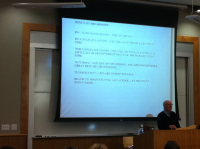
Zahavi v. State (Nev. Supreme Ct. – Feb. 26, 2015)
Beginning in the late 1990’s, Zahavi began gambling, obtaining lines of credit, and executing markers at various Las Vegas casinos. In 2008, Zahavi failed to pay $384,000 in markers he took from the Hard Rock Hotel, Caesars Palace, Venetian, and Palazzo. The State filed a four count indictment against Zahavi for writing checks with insufficient bank funds with intent to defraud. A jury found Zahavi guilty on all four counts.
On appeal, Zahavi contended that the casinos had knowledge of his insufficient funds and inability to pay back the 14 gaming markers he obtained. The Nevada Supreme Court analyzed whether the district court should have instructed the jury that a casino’s knowledge of insufficient funds in a casino patron’s bank accounts at the time of the issuance of a marker negates the intent-to-defraud element of NRS 205.130(1)(e).
The Court held that the “intent to defraud” element may be negated by a disclosure of insufficient funds to the payee and that Zahavi was entitled to have the jury so instructed if there was proof in the record supporting the instruction. The Court concluded that because Zahavi failed to make an affirmative disclosure to the casinos and the casinos had no present knowledge of his insufficiency of funds at the time the markers were executed, there was no evidence to negate the intent-to defraud element, and therefore the district court did not abuse its discretion by refusing the instruction.
Zahavi also challenged the constitutionality of NRS 205.130, arguing that it violates the provision in the Nevada Constitution that prohibits imprisonment for failing to pay a debt, except in cases of fraud. Based on prior decisions, and persuasive authority from other jurisdictions with similar constitutional prohibitions, the Court concluded that NRS 205.130 does not violate article 1,section 14 of the Nevada Constitution because Zahavi’s conviction is based on committing a fraudulent act and not on incurring a debt.




